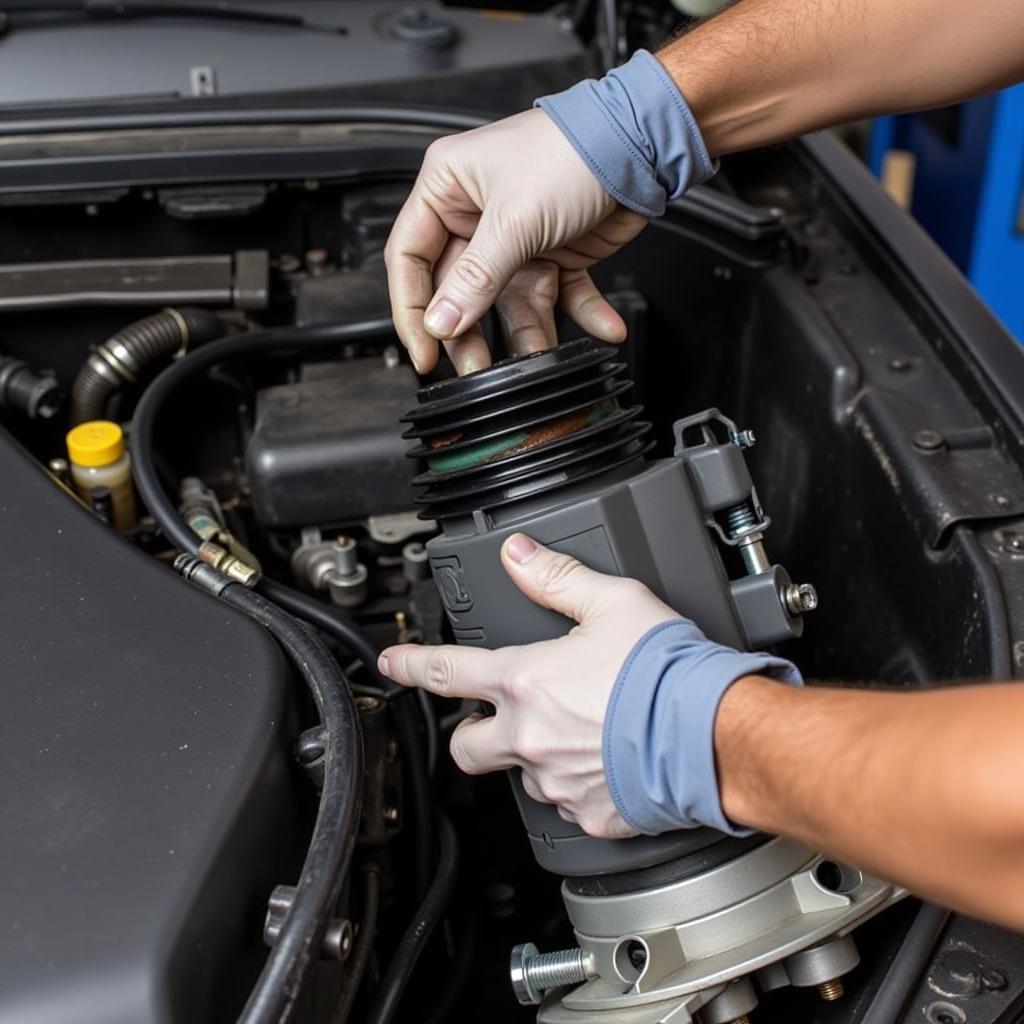It’s frustrating when your car battery charger isn’t doing its job, leaving you stranded with a dead battery. Thankfully, most issues with car battery chargers can be fixed with a little troubleshooting. This guide will help you identify common problems and provide solutions to get your charger working again.
Common Reasons Why Your Car Battery Charger Isn’t Charging
1. Check the Connections
The most common reason for a car battery charger not working is a loose or corroded connection. Inspect the battery terminals, charger clamps, and any connecting wires.
- Battery Terminals: Look for corrosion, loose connections, or damaged terminals. Clean any corrosion with a wire brush or baking soda paste.
- Charger Clamps: Ensure the clamps are securely attached to the battery terminals. Check if the clamps are damaged or worn.
- Wires: Verify that the wires are not frayed, broken, or disconnected.
Tip: If you have corrosion on your battery terminals, it’s a good idea to fix car battery with Epsom salt.
2. Battery Charger Malfunction
While less common, your car battery charger could be faulty. Here are some signs of a malfunctioning charger:
- No Output: The charger doesn’t show any sign of life, such as a light indicator or fan running.
- Erratic Output: The charger shows signs of working but isn’t producing the correct voltage or current.
- Burning Smell: A burning smell might indicate a short circuit or overheating within the charger.
If you suspect a charger malfunction, it’s best to replace it.
3. Battery Issues
A dead or damaged battery can also prevent a charger from working correctly.
- Dead Battery: If the battery is completely dead, it might not be able to accept a charge. You may need a jump start or a specialized battery charger for deep-cycle batteries.
- Damaged Battery: A damaged battery may have internal shorts or other defects that prevent it from charging properly.
If you suspect a battery issue, consider how to fix low car battery.
4. Battery Charger Settings
Make sure the battery charger is set to the correct voltage and current for your battery type.
- Voltage: Car batteries typically require a 12-volt charge. Ensure the charger is set to 12 volts.
- Amperage: The amperage setting depends on your battery size and condition. Use a lower amperage setting for a smaller battery or a battery that is deeply discharged.
Tip: If you’re not sure about the correct settings, consult your car’s owner manual or the battery charger’s instructions.
Troubleshooting Tips
1. Check the Circuit Breaker
If your battery charger is plugged into an outlet, the circuit breaker might be tripped. Check the breaker and reset it if necessary.
2. Use a Different Outlet
Try plugging your charger into a different outlet to eliminate the possibility of a faulty outlet.
3. Test the Battery Charger
If you have another battery, test the charger on a different battery to see if it works correctly.
Tip: If you’re not comfortable working with electrical equipment, it’s always best to consult a qualified mechanic.
What to Do If Your Car Battery Charger Still Isn’t Working
If you’ve checked all the connections, settings, and components and your charger still isn’t working, it’s time to consult a professional. A mechanic can diagnose the problem and help you get your charger working again.
Expert Opinion
“A car battery charger is an essential tool for any car owner. It’s important to understand the basics of how they work and how to troubleshoot common problems. If you’re not comfortable working with electricity, it’s always best to call a professional.” – John Smith, Certified Automotive Technician
Conclusion
A non-charging car battery charger can be a frustrating problem, but it’s often fixable with some basic troubleshooting. By checking the connections, settings, and components, you can identify and resolve the issue. If you’re still having trouble, don’t hesitate to contact a qualified mechanic for help.
Don’t let a faulty car battery charger leave you stranded. Contact us today for expert advice and support!
Phone: +1 (641) 206-8880
Office: 500 N St Mary’s St, San Antonio, TX 78205, United States
FAQ
Q: What happens if I continue using a faulty battery charger?
A: Using a faulty battery charger can damage your battery, cause electrical fires, or even injure you. It’s essential to identify and fix the problem promptly.
Q: Can I use a regular phone charger to charge my car battery?
A: No, phone chargers are designed for low-voltage devices and can’t charge car batteries.
Q: How long should it take to charge a car battery?
A: The charging time depends on the battery’s size and condition, but it usually takes 4-6 hours.
Q: Can I overcharge a car battery?
A: Overcharging can damage a car battery. Most modern battery chargers have built-in protection to prevent overcharging.
Q: How often should I charge my car battery?
A: A healthy car battery should be charged every few months, even if it’s not used regularly.





Leave a Reply